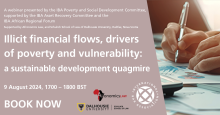Webinar Invitation: Illicit financial flows, drivers of poverty and vulnerability: a sustainable development quagmire
This webinar explores the critical issue of illicit financial flows (IFFs) and their impact on poverty and vulnerability. IFFs significantly undermine efforts towards sustainable development by diverting resources away from public services and infrastructure, exacerbating economic inequality, and perpetuating cycles of poverty. Expert speakers from diverse fields, including academia, policy-making space, and private practice, will explore the mechanisms through which IFFs operate and their detrimental effects on economic stability and social equity.
A webinar presented by the IBA Poverty and Social Development Committee, supported by the IBA Asset Recovery Committee and the IBA African Regional Forum. Supported by Afronomicslaw, and Schulich School of Law of Dalhousie University, Halifax, Nova Scotia
